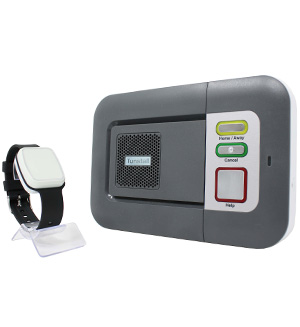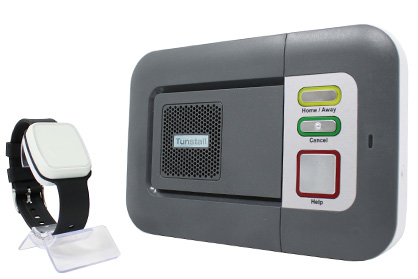Fall Alarms and Detectors
For many of our customers, falls are a common factor leading them to choose a personal alarm.
At LifeConnect24, we want you to know you’re always in safe hands. Our Fall Detector Alarms offer extra reassurance and peace of mind by automatically alerting our TSA-accredited Response Team should you fall.
Our fall alert devices can be worn as a fall alarm watch or pendant to help you stay confident and independent at home, knowing that help can be arranged quickly and easily. When the LifeConnect24 Fall Detector Alarm senses a sudden drop, it raises the alarm automatically and then keeps you connected, even if you’re unable to press the fall detector button. Just knowing that help is available means you can live confidently at home every day.


LifeConnect24 Personal Alarm with Fall Detection
• Automatic fall detection
• Waterproof pendant
• 100m alert range
£17.99/month
Paid quarterly plus initial
set-up fee of £35.00
£165/year
Paid yearly plus initial
set-up fee of £35.00


LifeConnect24 SmartLife Alarm with Fall Detection
• Automatic fall detection
• Rapid connection technology
• 300m range
£23.99/month
Paid quarterly plus initial
set-up fee of £35.00
£235/year
Paid yearly plus initial
set-up fee of £35.00
What is a Fall Alarm?
Every year, one in three over-75s are likely to experience a fall. While personal alarms provide peace of mind for thousands of people across the UK, a fall alarm offers further reassurance by automatically sending an alert when it senses a fall. It means you can live confidently every day, knowing that help is on its way without needing to press a button.
How the Fall Alarm Works
Our fall alert systems are fitted with a sensor that uses innovative technology to detect a fall instantly. You can wear it as a fall alert bracelet or pendant. A fall is sensed by measuring altitude and speed to identify a sudden drop, then sends an automatic alert to our 24/7 Response Team.
If you have an emergency other than a fall, you can still alert the Response Team, simply by pressing the button on the fall detector.
Who is a Fall Detector/Fall Alarm for?
Fall alarm for the elderly
Many of our elderly customers choose a personal alarm to stay independent in their own homes. If you live alone, have mobility problems, or live with long-term health conditions, a fall alarm offers extra reassurance. And it gives your friends and family peace of mind that if you do fall, assistance can be there, if needed.
Fall alarms for security and independence
A fall alarm isn’t just for the elderly. If you want added peace of mind wherever you are in your home – shower, kitchen, bath, bedroom, or garden – a fall alarm gives you confidence and allows you to maintain your independence for longer.
If you have experienced a fall in the past or just had an operation, a fall detection alarm can help you regain your confidence as you recover. The LifeConnect24 service has been specifically designed to be straightforward, simple, and easy to use.
Fall Detection Pendant
LifeConnect24 fall alert systems come in two parts: a base unit and your personal fall alarm pendant. The pendant contains the fall detection sensor and can be worn around your neck or as fall alert bracelet round your wrist for easy access in an emergency. Our pendants are lightweight and unobtrusive so you can continue to live independently. They’re also waterproof, making them ideal for use in the bath or shower, where slips and falls are more likely.
The LifeConnect24 Lifetime Warranty keeps you connected to our 24/7 service. All our fall detection devices come with up to seven years of battery life without charging. When the battery runs low, a signal is automatically sent to our Response Team, who will then arrange a free replacement.
If you’re worried about losing your fall alarm pendant, or would like another person in your household to be covered by a single alarm plan, simply order an additional fall detector pendant by calling our customer service team.
VAT Exemption on fall alarms
You do not need to pay VAT on your personal alarm if you’re living with:
- a long-term condition (that has an adverse effect on your ability to perform daily tasks)
- a chronic condition
- a terminal illness
